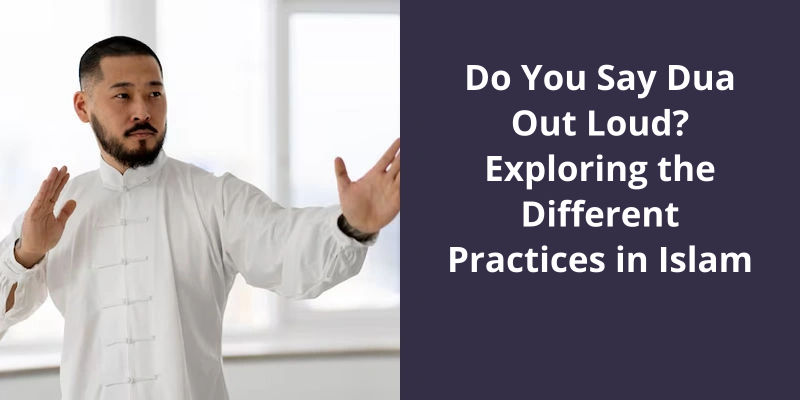Whether you say Dua out loud or silently can depend on circumstances, personal preferences and certain Islamic practices. Dua, which is the act of supplication in Islam, is often said silently and privately in one’s heart. It’s a personal conversation between the supplicant and Allah, and as such, can be conducted quietly with sincerity and focus. However, during certain formal prayers, for instance, in congregational prayers or during the Taraweeh in Ramadan, the imam might say the Dua out loud. It is crucial to remember that the core of making a Dua is not about whether it’s said out loud or silently – what counts the most is the sincerity, focus, and devotion of individuals towards their connection with Allah.

Do You Make Dua Out Loud?
In the Islamic faith, dua is a form of prayer that involves communicating with Allah and asking for His guidance, forgiveness, and assistance. While there’s no set way to make dua, some Muslims prefer to say their duas out loud, as it helps them to connect more deeply with Allah and feel more focused in their prayers.
When you say your duas out loud, you aren’t just asking Allah for help, but also engaging all of your senses in the act of worship. This can be particularly helpful if you’re feeling distracted or disconnected during your prayers, as it forces you to focus on each word and phrase. Additionally, saying your duas out loud can help you to memorize them more easily, so that you can recite them more confidently and frequently.
Whether you choose to say your duas out loud or silently, it’s important to approach prayer with humility, sincerity, and a willingness to trust in Allahs wisdom and mercy. By doing so, we can cultivate a deeper sense of faith and peace in our hearts, and feel more supported and guided as we navigate lifes challenges and blessings.
The Different Times and Occasions When Muslims Make Dua
- During the five daily prayers
- At the end of the Quran recitation
- During the month of Ramadan
- When visiting the sick
- During the last third of the night
- When breaking the fast (at iftar)
- Before and after eating
- Before and after studying or taking exams
- When leaving and returning home
- When entering and leaving the mosque
Can I Make Dua if I Don’t Pray?
This is a common misconception. Dua isn’t limited to only being recited after prayer. In fact, dua can and should be made throughout the day. It’s a form of communication with Allah and should be encouraged, especially during times of distress or need.
We’re required to perform it five times a day, as it’s the most essential form of worship. Neglecting prayer is a grave sin and can lead to severe consequences.
However, it’s also important to recognize that everyone has their own unique relationship with Allah. Some may struggle with keeping up with their prayers but are still devout in their worship. Others may have trouble with making dua on their own, but are consistent in their daily prayers. It isn’t our place to judge or question someone elses faith.
In essence, making dua is an intimate act of worship that should come from the heart. It shouldn’t be performed simply because it’s a ritual or duty required by others. We should strive to maintain a consistent connection with Allah through prayer and dua, and encourage others to do the same in their own unique way.
While prayer is a fundamental aspect of Islam, it shouldn’t be used as a means to restrict the act of dua. Dua can and should be made at any time, and should come from a true desire to communicate with Allah. We should encourage each other in our respective journeys towards a deeper connection with Allah, and not let ultra-strict voices deter us from legitimate forms of worship.
How to Make Dua With Sincerity and From the Heart.
- Sit in a quiet and clean place facing the Qiblah
- Praise and glorify Allah by reciting Tasbih, Tahmid, and Takbir
- Invoke blessings on the Prophet Muhammad (peace be upon him)
- Confess your sins and ask for forgiveness
- Begin your dua with Allah’s beautiful names and attributes
- Express gratitude to Allah for His blessings
- Be honest and genuine in your dua
- Ask for what you want with conviction and expectation
- End your dua with salutations to the Prophet Muhammad (peace be upon him) and with faith in Allah’s response
Source: Do you think Allah will answer my duas if I don’t pray?..
It’s important to be mindful of the use of language when making dua. While expressing ourselves through poetry and rhyme might seem like a nice touch, it can actually detract from the sincerity and humility required in dua making. In fact, excessive rhyming and exertion to achieve it can be viewed as a form of transgression that Allah swt dislikes in all things, including dua. Let’s explore some other things to avoid when making dua.
What Should You Not Say in Dua?
It’s important to remember that dua is an act of worship and a means of communicating with Allah. It shouldn’t be taken lightly and should be done with sincerity and humility. One should avoid any form of arrogance or self-praise in their dua. It’s Allah who grants our wishes and fulfills our needs, and we should always acknowledge His power and mercy.
Another thing to avoid in dua is asking for something that’s haram or prohibited in Islam. We should strive to make dua for things that are beneficial for us in this life and the hereafter. We should also avoid making dua against others, as this goes against the teachings of Islam. We should instead ask for the guidance and forgiveness of Allah for ourselves and for others.
It’s also important to avoid making dua with a distracted or negligent heart. We should focus our attention on Allah and not be distracted by worldly thoughts or desires. Similarly, we should avoid making dua with a doubtful heart. We should have complete trust and faith in Allah and His ability to grant our wishes.
In addition, we should avoid making dua with a sense of entitlement or expectation. We should remember that Allah is the Most Merciful and Generous, and whatever He grants us is a blessing and a favor. We should always be grateful for what we’ve and not take it for granted.
Finally, we should avoid making dua in a way that’s disrespectful or inappropriate. We should use appropriate language and tone, and avoid making dua in public places where it may cause discomfort or inconvenience for others. Moreover, we should avoid making dua in a state of impurity or while engaging in sinful activities.
Dua is a powerful tool for seeking Allahs help and guidance, and we should approach it with the utmost sincerity and humility. By avoiding these mistakes in dua, we can increase the effectiveness of our prayers and strengthen our relationship with Allah. May Allah accept our dua and guide us on the straight path.
Now that we’ve talked about the importance of dua and it’s benefits, it’s time to look at the etiquettes of making dua. How we say our dua matters just as much as why we say it. By following a few simple guidelines, we can develop a stronger connection with Allah and ensure that our supplications are heard and accepted. In this article, we will explore some of the best practices for making dua, from invoking Allah’s names to having faith in the power of our words.
What Is the Best Way to Say Dua?
Dua is an integral part of Muslim worship and communication with Allah. It’s an act of humbling oneself before Allah, seeking His mercy, and requesting His guidance and assistance in all aspects of life. Muslims are encouraged to make dua frequently, for themselves and for others, as it instills a strong sense of reliance on Allah and strengthens their faith.
When it comes to saying dua, there are certain etiquettes that should be observed. Firstly, it’s important to begin by sending salawat (blessings) on the Prophet Muhammad (peace be upon him) by saying “Allahummasalli ala Muhammadin wa ala aali Muhammadin” which means “O Allah, bestow peace and blessings upon Muhammad and the family of Muhammad”. This shows respect and love for the Prophet, who’s the leader of the Muslim community and the beloved messenger of Allah.
Another important aspect of dua is using Allahs beautiful names to call upon Him, such as Ar-Rahman (The Most Merciful) or Al-Hakeem (The Most Wise). By using these names, one acknowledges Allahs attributes and expresses reliance on His qualities. Additionally, it’s recommended to praise Allah as He deserves, acknowledging His greatness and expressing gratitude for His blessings and favors.
While making dua, it’s preferable to face the qiblah, which is the direction of the Kaaba in Mecca, as it’s the holiest site in Islam and the place towards which Muslims direct their worship. This demonstrates physical and spiritual orientation towards Allah and serves as a reminder of the unity and universality of the Muslim ummah (community).
To begin the act of dua, one should raise their hands into the position of making dua, which is with the palms facing upward towards the sky. This physical posture symbolizes humility, submission, and sincerity in front of Allah, and shows a readiness to receive His blessings and mercy. Moreover, having faith that ones dua will be accepted and that Allah will respond, whether in the form of granting the request or providing something better, is an essential aspect of dua. It’s important to remember that Allah knows what’s best for us and has the power to grant our wishes, so we should trust in Him completely and have patience in waiting for His response.
To make an effective dua, one should observe certain etiquettes such as beginning with salawat on the Prophet, using Allahs beautiful names, praising Him deservedly, facing qiblah, raising the hands in dua, and having faith and trust in Allahs response. By doing so, Muslims can strengthen their connection with Allah, improve their character, and reap the benefits of His mercy and guidance in this life and the hereafter.
The Role of Dua in Islamic Spirituality and Self-Improvement
Dua is an important part of Islamic spirituality and self-improvement. It involves making supplications and requests to Allah, often in the form of prayers. Muslims believe that dua can bring them closer to Allah, and that it can help them to achieve their goals and overcome their challenges. Dua is also considered to be a powerful way to seek forgiveness and to express gratitude. Overall, the practice of dua is seen as fundamental to Islamic life and is highly valued in Muslim communities around the world.
Once we finish making dua, it’s important to know what to say next. In Islam, the act of seeking forgiveness from Allah is highly praised, and it’s one of the most effective ways to purify one’s heart. Therefore, after finishing the prayer, the Prophet used to seek the forgiveness of Allah. He repeated the phrase “Astaghfir Allah” three times to emphasize the importance of seeking forgiveness. This article will explore the significance of seeking forgiveness and the different ways we can do it after making dua.
What Do You Say After Making Dua?
Sometimes, he’d say it three times, and other times he’d say it more than that. The Prophet also used to recite various supplications after the salaam such as the tasbeeh (Subhanallah), tahmeed (Alhamdulillah), and takbeer (Allahu Akbar). It’s also recommended to recite the adhkaar (remembrance of Allah) after completing the prayer, such as the morning and evening remembrances, as well as other specific supplications.
When making duaa after completing the prayer, it’s important to have sincerity and humility in our hearts. We should recognize our weakness and dependence on Allah, and ask Him for our needs with humility and conviction. Some scholars recommend raising our hands while making duaa, while others say that it isn’t necessary.
It’s important to remember that making duaa is a powerful act of worship in Islam, and it’s recommended to make duaa frequently throughout the day. We should make duaa not only for ourselves but also for our loved ones, the Ummah, and for the whole world. This is a way of showing compassion and empathy towards others, and seeking blessings for them as well.
Furthermore, it’s important to have patience and perseverance when making duaa, as Allah may not answer our prayers immediately. We should continue to make duaa with sincerity and trust in Allahs plan, knowing that He knows what’s best for us. Through duaa, we should seek Allahs guidance, help, and mercy in all aspects of our lives, both in this world and in the Hereafter.
Conclusion
In conclusion, whether you choose to say your duas out loud or silently in your heart ultimately depends on your personal preference and the situation at hand. However, it’s important to remember that making dua is an integral part of a Muslim's daily routine and should be done whenever the need arises, regardless of the method used. Additionally, the act of dua serves as a reminder of our reliance on Allah and encourages us to always turn to Him for guidance and help. So the next time you feel the need to ask Allah for something, don't hesitate to make dua in whichever way feels most comfortable for you.





